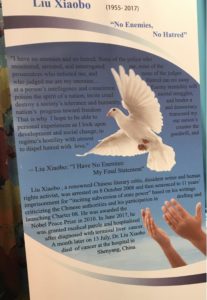Posts Tagged ‘Tibetan PEN’
“Finding Room for Common Ground: No Enemies, No Hatred”
The train from Copenhagen airport to Malmö, Sweden took just half an hour across the 21st century Øresund Bridge, which spans five miles of water, then the train dove into 2.5 miles of tunnel. Looking out the window at farmland and the blue waters of the Baltic Sea, I imagined this journey was not so easy 74 years ago with Nazis in pursuit. In 1943 as the Nazis went to sweep Denmark’s 7800 Jews into concentration camps, Danish and Swedish citizens rallied, and 7220 people managed to escape in boats across this Sound to nearby Sweden. Thousands landed in Malmö where I was headed for a less dramatic, but still fraught, occasion.

Members of the Independent Chinese PEN Center (ICPC) whose writers live inside and outside mainland China were joining writers from Uyghur PEN, Tibetan PEN and members from Inner Mongolia, along with writers from PEN Turkey and Azerbaijan for the First International Conference of Four-PEN Platform: “Finding Room for Common Ground: No Enemies, No Hatred.” Swedish PEN was providing the safe space for debate, discussion and strategies of action on human rights and freedom of expression. Just six weeks before, one of ICPC’s founding members and honorary President Nobel Laureate Liu Xiaobo, died in a Chinese prison after serving nine years of an 11-year sentence for drafting Charter 08, a document co-signed by 308 writers and intellectuals calling for a more democratic and free China.
A recognized leader in China’s Democracy Movement, Liu Xiaobo’s loss was deeply felt. A number of the writers gathered knew and worked with Liu. Most knew at least one fellow writer in prison. Many now live in exile themselves. Almost half of PEN International’s writers-in-prison cases are located in the regions represented at the conference.
The theme “No Enemies, No Hatred”—drawn from Liu Xiaobo’s final statement at his trial—sparked the debate in Malmö.

Keynote speaker Nobel Laureate Shirin Ebadi challenged, “But I do have enemies and I do feel hatred.” Facing death threats from her government in Iran, she had to leave everything behind at age 63 and move to London.
“Liu Xiaobo said he had no hatred and no enemies, but he also never compromised with any dictators,” she noted. “We must fight against dictators but our weapons are our pens and are nonviolent. We must not be silent. We can’t compromise with governments such as China who would eradicate an ‘empty chair’ from the internet.” [When Liu Xiaobo was unable to attend the Nobel ceremony because he was in prison, the Nobel Committee placed an empty chair on stage to represent him. The Chinese government is said to have censored the term “empty chair” from the internet in China.]
“What is the use of a pen if Liu Xiaobo is dead?” challenged one writer. Another speculated that if Liu Xiaobo had known how his life would end, he would have changed his message. A friend of Liu’s assured that he would not because for him no enemies and no hatred was a spiritual commitment.
“Hatred only eats away at a person’s intelligence and conscience, and an enemy mentality can poison the spirit of an entire people (as the experience of our country during the Mao era clearly shows),” Liu declared to the court at his trial. “It can lead to cruel and lethal internecine combat, can destroy tolerance and human feeling within a society and can block the progress of a nation toward freedom and democracy…. I hope that I can answer the regime’s enmity with utmost benevolence, and can use love to dissipate hate…. No force can block the thirst for freedom that lies within human nature, and some day China, too, will be a nation of laws where human rights are paramount.”
Within this frame and this hope, stories of persecution were exchanged among the Tibetan, Uyghur and Mongolian writers in China and among writers from Azerbaijan and Turkey, where over 150 writers and journalists are currently in prison and over 100,000 judges, academics and civil servants have been fired.
Uyghur and Mongolian writers noted that starting September 1 the Uyghur language is banned from all schools.
“The Chinese call all Uyghurs terrorists,” said one participant. “I have never seen a gun or a bomb in my life, but my name is on Interpol’s list because of my pen. I am a German citizen, and I was in Italy, invited by the Italian Senate when Italian police arrested me because the Chinese government put me on a terrorist list because I speak out for the Uyghurs.”
Can one operate against totalitarian, oppressive governments without hatred and enemies? The question remained unresolved, but participants agreed that protest and actions needed to remain nonviolent. To amplify the voices of the writers who were in prison, those outside could publish them, protest to their governments and recognize the writers with awards. Implicit was a belief in the power of culture and ideas to ultimately change society.
The 2016 Liu Xiaobo Courage to Write Award was given at the conference to Hu Shigen and Mahvash Sabet. Writer and lecturer Hu Shigen spent his career in the Democracy Movement since 1989 Tiananmen Square when he was arrested for “counterrevolutionary propaganda” and sentenced to 20 years in prison and after release was arrested again for “subverting state power” and returned for seven and a half years in prison where he still resides. Mahvash Sabet, a teacher and noted Baha’i poet, was detained for her faith and for “acting against the security of the country and corruption on earth” in Iran and is now serving a 20-year sentence in Evin prison in Tehran. Her friend Shirin Ebadi accepted the award on her behalf.
Other cases highlighted by the conference included Ilham Tohti, Nurmuhemmet Yasin, Gulmire Imin, Memetjan Abdulla, Gheyret Niyaz, Zhao Haitong, Omerjan Hasan, Qin Yongmin, Zhang Haitao, and Mehman Aliyev. The gathering also highlighted the situation of Liu Xia, Liu Xiaobo’s wife, who is believed still under house arrest. Many are working in the hope of getting her out of China.
When Shirin Ebadi was presented a statue of Liu Xiaobo, she noted that it would sit beside a statue she’d been given of Martin Luther King.

Dr. King’s writing of 54 years ago in “Letter from a Birmingham Jail” read at the closing demonstrated the power of ideas and words to endure long after their author has passed away: “We are caught in an inescapable network of mutuality, tied in a single garment of destiny. Whatever affects one directly, affects all indirectly.”